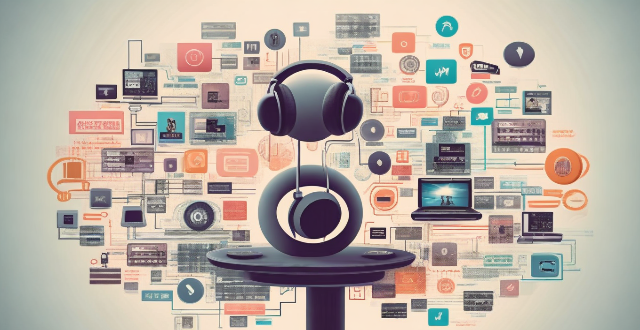The music industry has undergone a significant transformation due to digital technology, including the rise of streaming services, social media promotion, virtual concerts, and increased collaboration. This transformation has both positive and negative impacts but also presents new opportunities for growth and innovation.

The Digital Transformation of the Music Industry
The music industry has undergone a significant transformation in recent years, largely due to the advent of digital technology. This shift has had both positive and negative impacts on the industry, but it has also presented new opportunities for growth and innovation. In this article, we will explore how the music industry is adapting to digital transformation.
Streaming Services
One of the most significant changes in the music industry is the rise of streaming services like Spotify, Apple Music, and Amazon Music. These platforms have revolutionized the way people consume music, allowing them to access millions of songs from anywhere at any time. As a result, physical sales of music (such as CDs and vinyl records) have declined sharply, while streaming revenue has become a major source of income for artists and record labels.
Key Points:
- Streaming services have made music more accessible than ever before.
- They have also changed the way artists are compensated, with royalties now based on plays rather than sales.
- Some argue that streaming has devalued music by making it seem "disposable."
Social Media and Fan Engagement
Social media platforms like Twitter, Instagram, and TikTok have become essential tools for musicians looking to connect with their fans and promote their work. Artists can now reach millions of potential fans without relying on traditional media outlets or expensive marketing campaigns. Additionally, social media allows fans to engage directly with their favorite artists, creating a sense of community around their music.
Key Points:
- Social media provides a direct line of communication between artists and fans.
- It has democratized the promotion process, allowing independent artists to compete with major labels.
- However, social media can also be a double-edged sword, as negative comments and online harassment can take a toll on artists' mental health.
Live Virtual Concerts
The COVID-19 pandemic forced the cancellation of many live events, including concerts and festivals. In response, many artists began hosting virtual concerts through platforms like Twitch and YouTube. While these performances lacked the energy and spontaneity of in-person shows, they allowed fans to experience live music in a safe and accessible way. As the pandemic continues, virtual concerts may become a permanent fixture in the music industry landscape.
Key Points:
- Virtual concerts provide a safe alternative to in-person events during times of crisis.
- They offer increased accessibility for fans who cannot attend live shows due to location, disability, or financial constraints.
- However, some argue that virtual concerts cannot fully replicate the communal experience of attending a live event.
Collaboration and Innovation
Digital technology has also facilitated collaboration among musicians from different genres and locations. Artists can now work together remotely using digital audio workstations (DAWs) and file-sharing platforms like Dropbox or Google Drive. This has led to an increase in innovative cross-genre projects and collaborations that would not have been possible in the pre-digital era.
Key Points:
- Digital technology makes it easier for artists to collaborate across distances and genres.
- This has led to increased creativity and innovation within the industry.
- However, some worry that overreliance on technology could lead to a loss of human connection and spontaneity in music creation.
Conclusion
In conclusion, the music industry is adapting to digital transformation by embracing new technologies and platforms that allow for greater accessibility, engagement, and collaboration among artists and fans alike. While there are certainly challenges associated with these changes (such as concerns about artist compensation and mental health), overall, digital transformation has opened up exciting possibilities for growth and innovation within the industry.